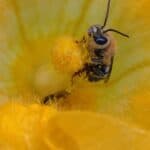The honey bee mortality rate is up in Canada- mites and a cool spring are to blame
It’s been a difficult start to spring for local beekeepers.
Many are opening their hives to find they’re colonies have died over the winter.
“I was shocked and disappointed to find that all my bees had died over the winter,” said Resident Abell Bee Keeper Mike Stanley. “The loss is devastating and mirrors the pattern of loss felt by many bee keepers across North America this season”.
While many things can affect bees’ ability to reproduce, experts agree that the varroa mite, has been particularly destructive this year. Bee keepers are reporting colony losses that are “significantly worse” than in previous years because of the varroa mite.
The mites are parasites that feed on adult bees and pupae. Once they latch onto the bee, they suck out its blood and protein reserves, transmit viruses and reduce the insect’s immune responses.
The damage that mites cause will create “a big challenge” over the next few years for beekeepers, says a University of Guelph expert.
According to the Canadian Honey Council, beekeepers in Alberta and Manitoba have lost an average of 40 to 45 per cent of their honeybees so far this year. In Quebec, losses are about 60 per cent.
Beekeepers are encouraging people to plant flowers and trees that attract pollinators to help keep bee populations strong.
Canadian Beekeepers Face Devastating Colony Losses. A U of G Expert Explains Why: https://news.uoguelph.ca/2022/04/canadian-beekeepers-face-devasting-colony-losses-a-u-of-g-expert-explains-why/


